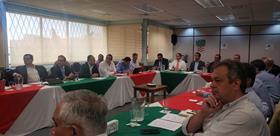
Leading Latin American banana producer and exporter associations have signed a joint declaration calling on the European Union to reconsider its decision to reduce the maximum residue levels (MRLs) of several chemicals widely used in banana production.
Representatives from the region’s biggest organisations, including Aebe, Acorbanec, Corbana, Augura, Canaba, BGA, Aproban and Apib, as well as pineapple and melon associations Banapinã and Canapems, met in San José on Wednesday to analyse the implications of the EU’s move, which could result in restrictions, or even a total ban, on a range of products including Clorotalonil, Mancozeb, Imazalil and Oxifluorfen, among others.
They maintain that the chemicals are essential to control pests and diseases such as Black Sigatoka, and that moves to restrict their use would have a serious impact on productivity and jobs.
The document will be delivered to the respective governments of each Latin American country so that they can in turn channel their concerns to the EU.
“The countries present agreed on the need for joint and coordinated action as this situation would put banana exports to the European Union at risk,” Acorbanec said in a press statement issued after the meeting.
Acorbanec also pointed out that the EU’s decision goes much further than the conditions set out under World Trade Organisation rules.
The EU’s hard stance on MRLs has drawn widespread criticism from producers, who claim it will make common diseases increasingly difficult to tackle and result in more expensive, poorer quality fruit.
Speaking at the International Banana Congress in May, Charlie Dawson of TC Transcontinenetal claimed the European Commission’s decisions were often based on sentiment rather than science.
“The EU says it is making decisions as a precautionary measure,” said Dawson. “It’s not based on science. It is difficult to analyse when it’s more political and emotional rather than scientific.
“These are new measures and are not handled bilaterally. Six hundred of the 800 chemicals used on crops are under review and facing elimination in the EU. This will affect the productivity in the banana plantations. It’ll cost production and employment, but the EU hasn’t budged. And they say we still have to sell at the same prices.”






No comments yet